Difference between revisions of "DW-WL02"
Jump to navigation
Jump to search
| Line 115: | Line 115: | ||
|- | |- | ||
|runtime||integer 0-100||1-4||15||runtime is the open/close time in seconds, is used for jalousie, gate, valve(2 pole); Example: runtime=15 | |runtime||integer 0-100||1-4||15||runtime is the open/close time in seconds, is used for jalousie, gate, valve(2 pole); Example: runtime=15 | ||
| + | |- | ||
| + | |runtimeopen||integer 0-60000||Blinds subId||-||Runtimeopen is the open time in milliseconds, is used for blinds; Example: runtimeopen=15000 | ||
| + | |- | ||
| + | |runtimeclose||integer 0-60000||Blinds subId||-||Runtimeclose is the close time in milliseconds, is used for blinds; Example: runtimeclose=15000 | ||
|- | |- | ||
|hold||integer 0-10000||1-4||500||hold is the bridging time in miliseconds, is used for gate and jalousie (by default hold is the same as runtime), lock; Example: hold=3500 | |hold||integer 0-10000||1-4||500||hold is the bridging time in miliseconds, is used for gate and jalousie (by default hold is the same as runtime), lock; Example: hold=3500 | ||
Revision as of 14:20, 10 August 2021
| DW-WL02.C | |||||||
|---|---|---|---|---|---|---|---|
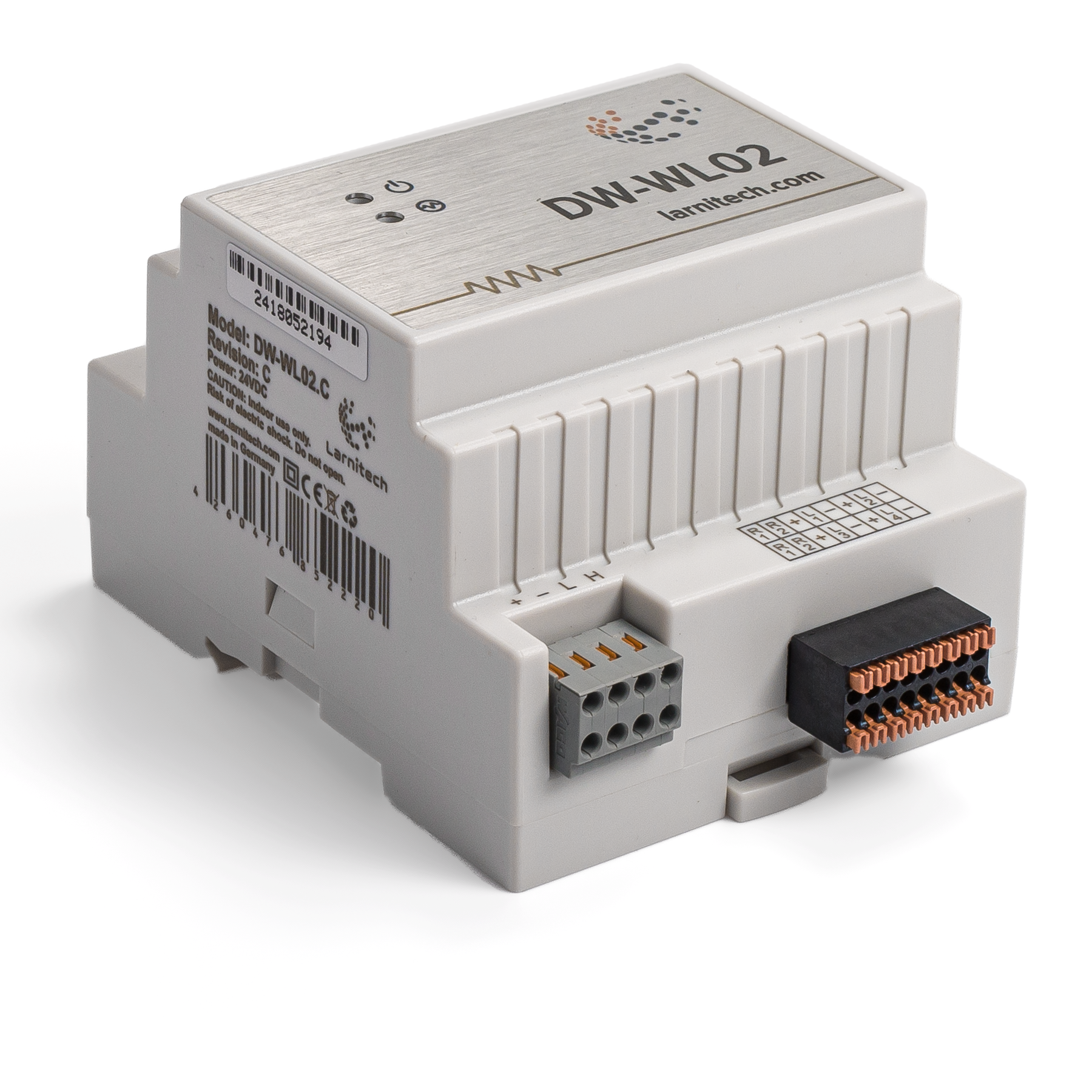 | |||||||
| |||||||
| |||||||
| |||||||
WATER LEAKAGE PROTECTION MODULE
The module supports the connection of 2 valves of water supply shutoff and 4 leakage sensors (up to 16 FW-WL.B/EW-WL.B ).
Features
- Supports 1p/2p valves
- Valve feedback reed switch
- 4 leakage zones
- Ability to connect up to 16 FW-WL.B/EW-WL.B sensors
- Sensor detection and diagnostics
CAUTION! All work related to the installation, connection, setting up, service and support must be carried out by qualified personnel with sufficient skills and experience in working with electrical equipment. To avoid the risk of fire, electric shock, damage to the system and/or personal injury, the system installation and assembly must be performed in accordance with the instructions listed below:
- all connectivity work must be carried out with the power turned OFF;
- use appropriate tools and personal protection against electric shock;
- do not use damaged cables, wires and connectors;
- avoid folding the cables and wires;
- do not apply excessive force to the wires by kinking or pressing them too hard: the inner conductors of the cables and wires may get stripped or damaged;
- do not use the power socket with poor contacts to connect;
- do not exceed the load limit parameters specified in the manual;
- the supply conductors wire section is subject to the specifications for current density limit, insulation type and wire material. Light section can result in cable overheating and fire.
When the power is on, NEVER:
- connect/disconnect the connectors;
- open modules and sensors.
Overview
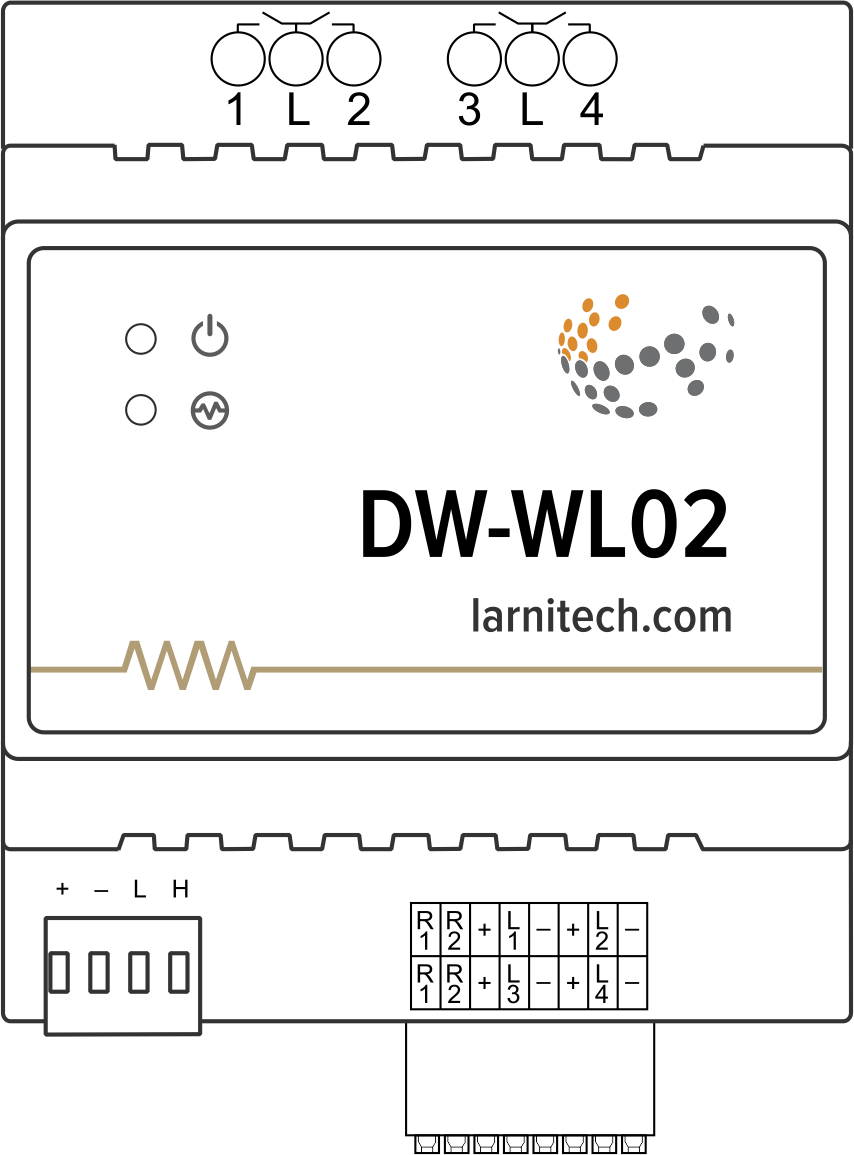
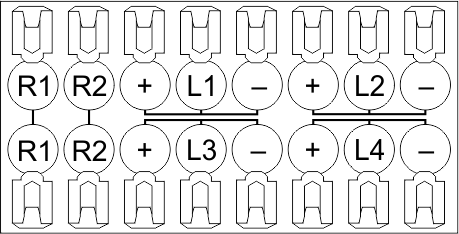
Example of connection
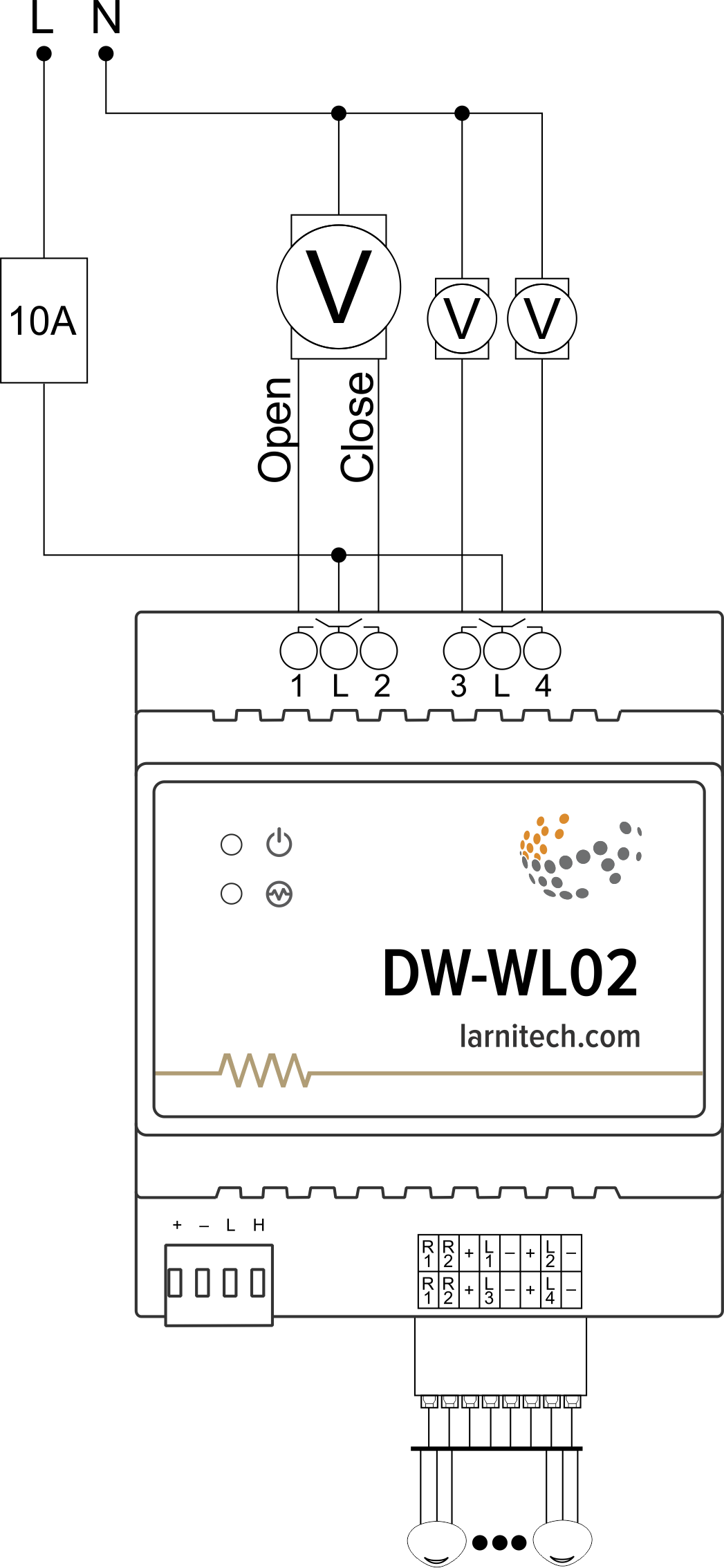
Module dimensions
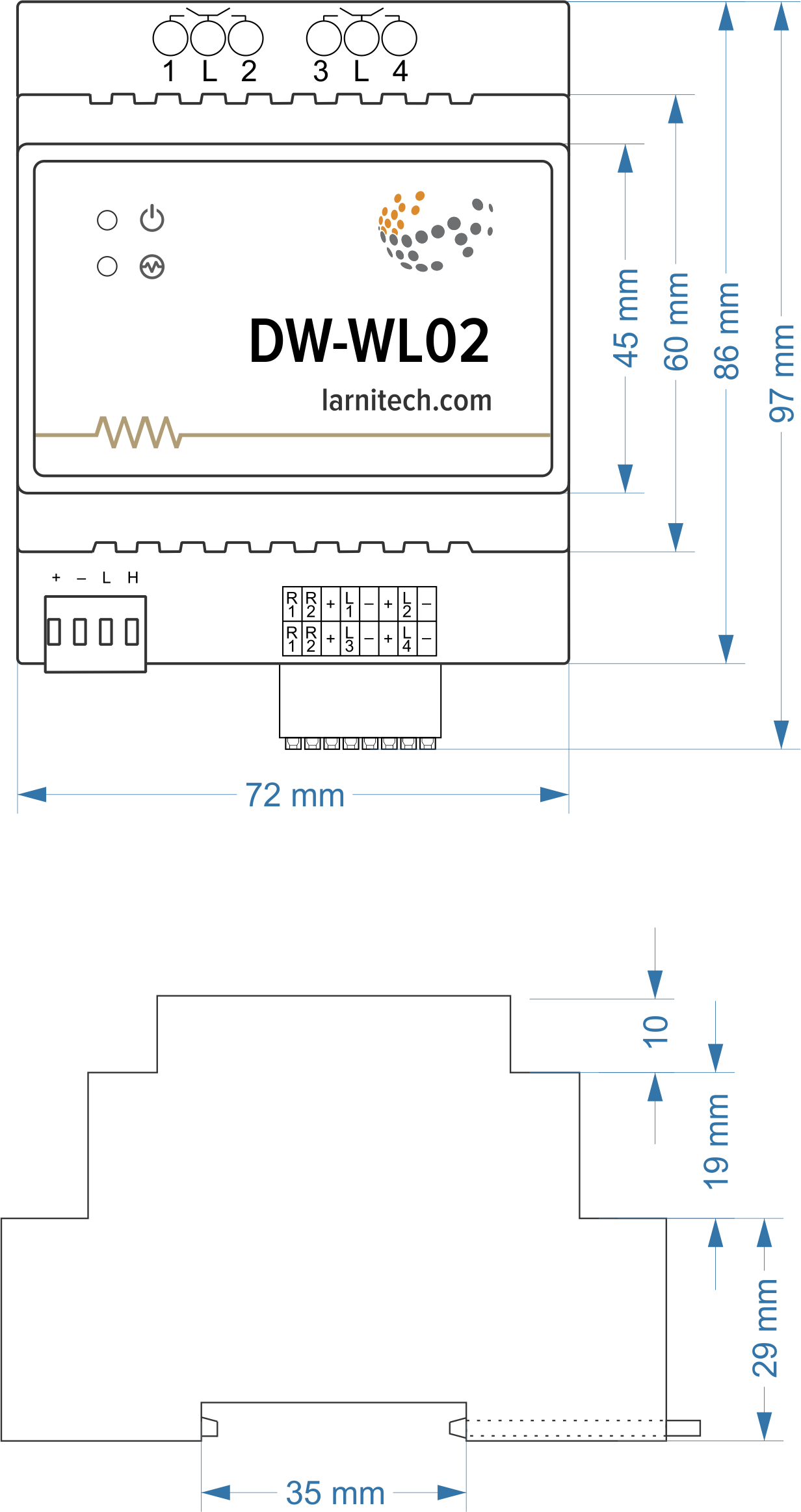
Internal layout
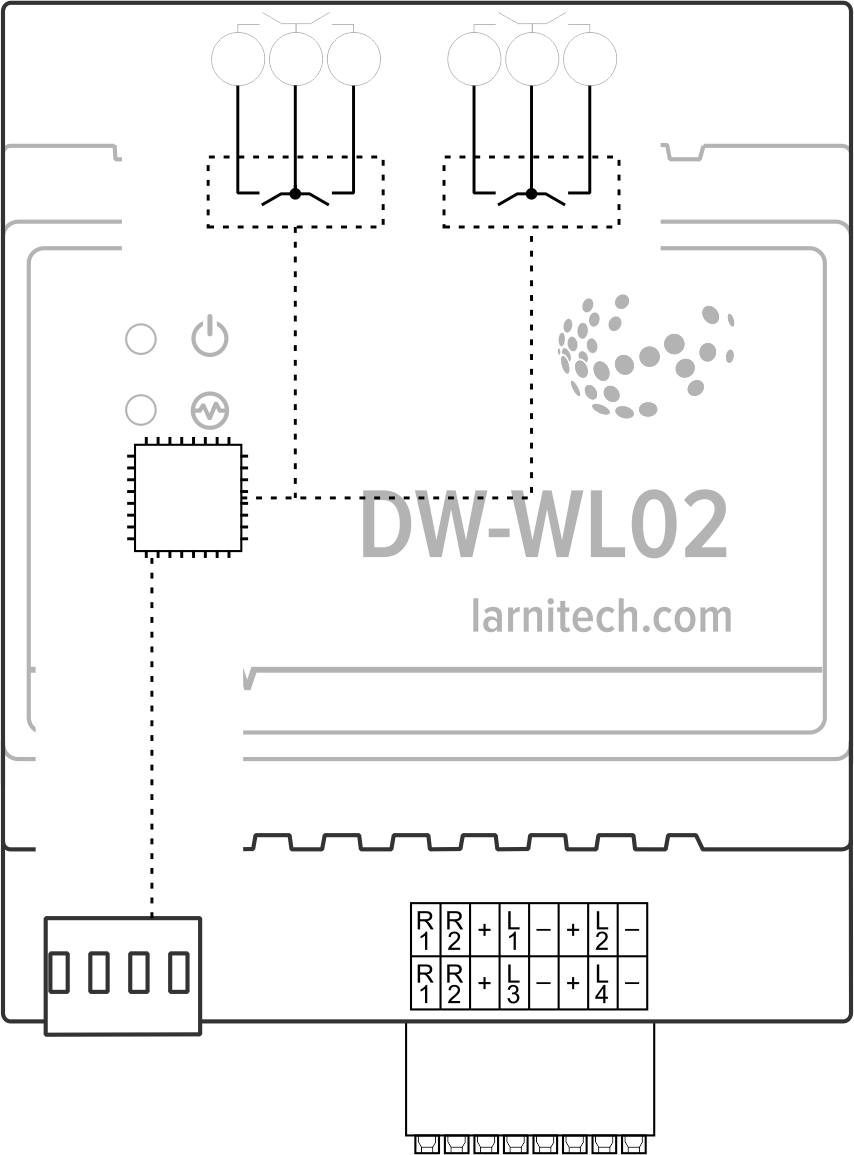
Module parameters
| Parameter name | Value |
|---|---|
| Number of sensor inputs | 4 FW-WL.A/EW-WL.A 16 FW-WL.B/EW-WL.B (4 per input) |
| Number of dry contact inputs | 2 |
| Output channels qty | 4 |
| Input voltage | 0-250 V AC/DC |
| Current type | AC/DC |
| Max load per channel | 5A |
| Power supply | 11.5 … 27.5 V DC from CAN |
| Max current(24V) | 60 mA |
| Sensors VCC output | 8..12 V |
| Sensors max VCC current | 70 mA |
| R1-R2 inputs max current | 3 mA |
| Bus type | CAN (4-wire) |
| Equipment installation type | DIN rail (EN 60715) |
| Case material | ABS |
| Protection | IP40 |
| Temperature range | -10 … +50 °C |
| Size | 4U, 69x110x58 mm |
| Weight | 100 g |
Indication of module operation
Bootloader
| Indicator | Status | Description |
|---|---|---|
| Device in bootloader | ||
| Downloading firmware | ||
| Flashing firmware |
Firmware
| Indicator | Status | Description |
|---|---|---|
| Identification | ||
| Operational mode | ||
Error | ||
| Lost connection to server | ||
| Overheat | ||
| Overload |
Module installation and connection procedure
- Install the module in the switchboard on the DIN rail and fix it with the special latch on the module base.
- Connect the CAN connector.
- Connect the channels.
- Configure the module using LT setup.
- Apply power to the load.
- Check all equipment for proper operation.
Module shut-off and deinstallation procedure
- Disconnect the power from the load.
- Disconnect the channels.
- Disconnect the CAN connector.
- Remove the module from the DIN rail, releasing the latch at the bottom of the module base.
HW settings
| Name | Type, range | SUBID | Default | Description |
|---|---|---|---|---|
| runtime | integer 0-100 | 1-4 | 15 | runtime is the open/close time in seconds, is used for jalousie, gate, valve(2 pole); Example: runtime=15 |
| runtimeopen | integer 0-60000 | Blinds subId | - | Runtimeopen is the open time in milliseconds, is used for blinds; Example: runtimeopen=15000 |
| runtimeclose | integer 0-60000 | Blinds subId | - | Runtimeclose is the close time in milliseconds, is used for blinds; Example: runtimeclose=15000 |
| hold | integer 0-10000 | 1-4 | 500 | hold is the bridging time in miliseconds, is used for gate and jalousie (by default hold is the same as runtime), lock; Example: hold=3500 |
| def | string 'ON' | 1-4 | 'OFF' | Def is the element status is set after restart, is used for lamp, heating, valve(1 pole); Example: def='ON' |
| out | char[4] | 98 | 'V-V-' | Each char is responsible for the type of a particular channel
Example: out='V-V-' |
| leak | char[4] | 98 | 'LLLL' | Each char is responsible for the type of a particular channel
|
| in | char[2] | 98 | 'KK' | Each char is responsible for the type of a particular channel
Example: in='HHKK' |
1<item addr="500:1" cfgid="53" hw="runtime=30" name="Valve" type="valve" uniq_id="4105"/>
2<item addr="500:3" cfgid="53" name="Jalousie" sub-type="120" type="jalousie" uniq_id="4117"/>
3<item addr="500:11" cfgid="53" name="Leak" type="leak-sensor" uniq_id="4107"/>
4<item addr="500:12" cfgid="53" name="Leak" type="leak-sensor" uniq_id="4108"/>
5<item addr="500:13" cfgid="53" name="Leak" type="leak-sensor" uniq_id="4109"/>
6<item addr="500:14" cfgid="53" name="Leak" type="leak-sensor" uniq_id="4110"/>
7<item addr="500:21" cfgid="53" name="Door" type="door-sensor" uniq_id="4111"/>
8<item addr="500:22" cfgid="53" name="Door" type="door-sensor" uniq_id="4112"/>
9<item addr="500:23" cfgid="53" name="Door" type="door-sensor" uniq_id="4113"/>
10<item addr="500:24" cfgid="53" name="Door" type="door-sensor" uniq_id="4114"/>
11<item addr="500:97" cfgid="53" name="Temperature" system="yes" type="temperature-sensor" uniq_id="4115"/>
12<item addr="500:98" cfgid="53" hw="leak='NNLL' in='HHKK' out='V-B-'" name="Temperature" system="yes" type="temperature-sensor" uniq_id="4116"/>